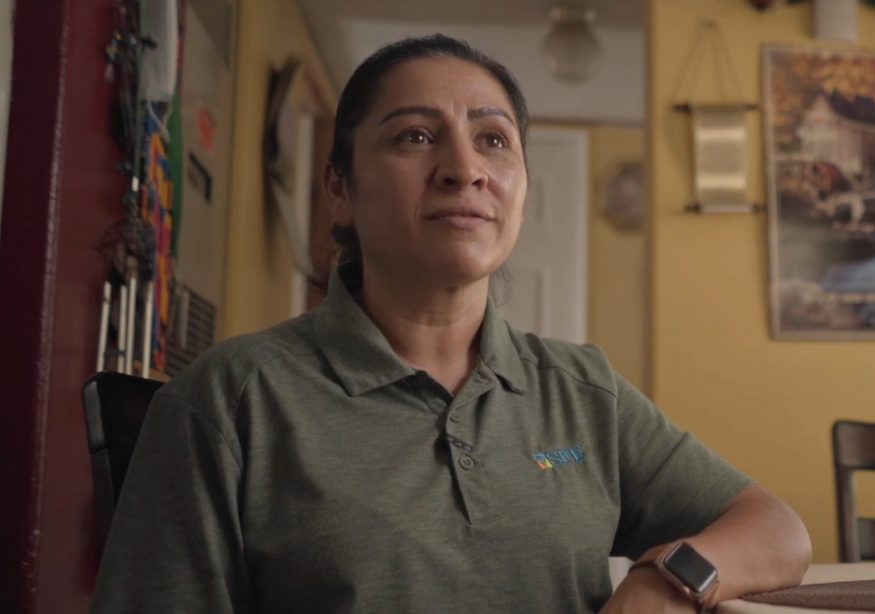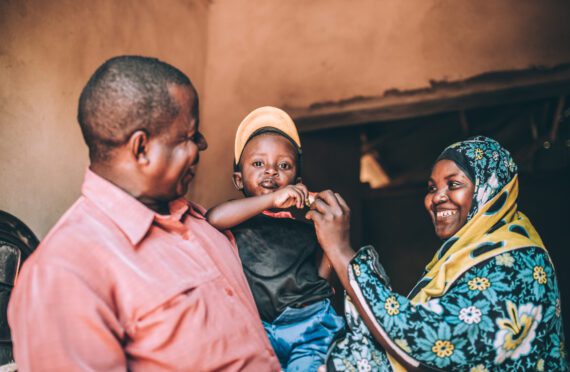By Jennifer Gonzalez
At 4:45 a.m., Alicia Cisneros awakes and gets ready for her job at a school cafeteria at Pojoaque Valley Elementary School in New Mexico.
Donning a green apron and hair pulled back in a ponytail, she is the first to walk through the school doors as dawn breaks to prepare the kitchen for the rest of the workers that will come later.
Every day, she and her co-workers prepare breakfast and lunch for 640 students – the majority from low-income households. On this day, the lunch menu consists of chicken tenders, mashed potatoes, gravy, corn, and apple sauce.
On some days Cisneros also cleans houses in Santa Fe – lengthening her workday by a few more hours. “Middle class people like us don’t just have one job. We have two jobs to be able to provide for our children,” she said.
Last year, Cisneros and millions more families like hers got some financial relief when the Child Tax Credit (CTC) was expanded for one year as part of the $1.9 trillion American Rescue plan passed by Congress and signed by President Biden.
Before the expansion, an estimated 27 million children lived in families that did not qualify for the full tax credit – a disproportionate number in communities of color. These are the families who are most likely to experience hunger.
The expansion included additional low- and middle-class working families becoming eligible for the tax credit. The tax credit benefit also increased from $2,000 per year to $3,600 for children up to age 6 and to $3,000 for children 6-17.
The CTC expansion expired last year. Bread for the World is advocating for Congress to make the expansion permanent.
Cisneros said the extra money helped her to pay her rent and gave her the financial freedom to spend more time with her teenage daughter Naidyn. After receiving the money, Cisneros said she was able to cut back on cleaning houses in the afternoons.
Cisneros said that she wished the extra money would have been available years ago when her other children were younger, and she had separated from her husband. “It was a very difficult time,” she said. “The money would have helped because I wouldn’t have had to work so hard and leave them alone for a long time because I had to be working.”
At age 20, Cisneros came to the United States from Villa Ocampo, Durango in Mexico – almost 30 years ago – to seek a better life for herself and her children. “Every immigrant arriving in this country gets here with a dream, and I think the greatest dream of all is having a better life, a better life for your children,” she said. But the decision did not come without its sacrifices. “Being alone with my children, that was the hardest part,” she said.
“[It’s] a huge responsibility to move them forward,” said Cisneros, about raising children as a single mother. “To push them to become good people. To help them go to school. At the same time to play role of father and mother. A mother does not substitute for a father and a father does not substitute for a mother.”
Nonetheless, Cisneros is grateful to “God for the opportunity to arrive in this country and to give my children a different life from the one I had.” Her three adult sons are flourishing personally and professionally.
As for her daughter, Cisneros said she is teaching her “that life is not so easy, that she has to learn to work doing many things. I have been teaching her from a very early age about working and what it means to work.”
She added: “I bring her to work with me so that she can see how hard you have to work when you don’t go to college. After all, she is in a country where it is possible to attend college and do whatever she wants to do.”
When Cisneros looks back on her life thus far, there is a certain amount of satisfaction in what she has achieved. She came to this country as a young woman and was able to raise children who are smart, compassionate, and hardworking.
And now, she still tends to the lives of young children through her work at the school cafeteria – a job deeply meaningful to her.
“I tell the people we work with that this is not just a job. We are working for the children,” Cisneros said. “We are there for them, not for us. Everything we do, we do it for them. It is a very beautiful thing.”
Jennifer Gonzalez is managing editor at Bread for the World.



